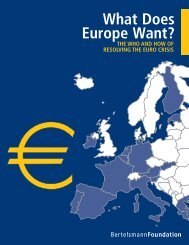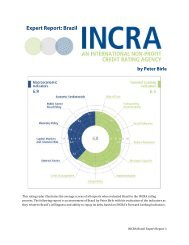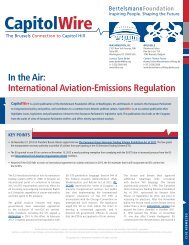BF-FieldManual-FEB13 -3.pdf - Bertelsmann Foundation
BF-FieldManual-FEB13 -3.pdf - Bertelsmann Foundation
BF-FieldManual-FEB13 -3.pdf - Bertelsmann Foundation
- No tags were found...
You also want an ePaper? Increase the reach of your titles
YUMPU automatically turns print PDFs into web optimized ePapers that Google loves.
MEMO ONTHE TRANS-ATLANTIC ECONOMYThe State of PlayThree medium-term trends will alter theUS and EU’s positions in internationaleconomic policymaking in 2013. First,the eurozone crisis and difficulties inresolving it, which “knocked the windout of the trans-Atlantic economy”, 1have caused American and Europeancompanies alike to rebalance theirinvestment in foreign affiliates onthe opposite side of the Atlantic. Theresult has been a marked reduction intrade and investment, particularly asexport demand dried up in Europe andthe European financial sector soughtto repatriate capital from the US.This occurred despite the remarkablebuoyancy of the trans-Atlantic economicrelationship during the early phase ofthe crisis (2008-11). The eurozone’s woeshave the potential to derail the US goalof doubling exports by 2015 and couldundercut US real sector growth, anengine of the recovery, which accountedfor about one-third of US GDP growthin 2011.The second trend is the divide betweenthe slow growth of the advancedindustrial economies in the US andEurope and the expanding emergingmarkets led by China. By 2030, thetrans-Atlantic share of global GDP isprojected to shrink to 31.6 percent.While this remains a formidable volume,it would nevertheless mark a diminishedability by the US and Europe to setglobal economic norms. According toInternational Monetary Fund estimates,in 2030 the combined economic weightof China (23.8 percent of global GDP)and India (10.4 percent) would surpassthat of the US (17.3 percent) andthe EU (14.3 percent). 2 This will be agame-changing situation for globaleconomic policy.The need to enshrine the principles of the liberal economicorder has not been greater since the first half of the 20thcentury, and the continued primacy of the US and EU inthe face of these global trends will depend on the abilityof political leaders to retrofit their economies for an age inwhich their power is no longer preeminent.The third trend, occurring in tandemwith the rebalancing of global economicweight, is the challenge posed by theemergence of state capitalism andthe role of state-owned enterprises(SOEs) in countries such as China. Thismodel, which eases access to “finance,preferential procurement, marketprotection, regulatory treatment [and]technology transfer”, and offers otherdomestic and international advantages,could undermine elements of the liberaleconomic system. 3The need to enshrine the principlesof the liberal economic order has notbeen greater since the first half of the20th century, and the continued primacyof the US and EU in the face of theseglobal trends will depend on the abilityof political leaders to retrofit theireconomies for an age in which theirpower is no longer preeminent. For thisto happen, agility and tight cooperationbetween the US and Europe is essential.A comprehensive economic packagewould provide an adrenaline shot ofbilateral economic growth that couldhelp counter the negative headwindsfrom the eurozone crisis. The window oftime for action on this front, however,is extremely limited. In fact, PresidentObama’s next four years in officemight be the final opportunity for acomprehensive initiative.The events of 2012 have alreadygenerated momentum for a newtrans-Atlantic economic partnership.Recent breakthroughs include the US-EU Organic Equivalence Agreementand eased EU restrictions on US beefimports. Other successes includejoint WTO dispute-settlement caseson raw materials and rare earthsagainst China, and a memorandum ofunderstanding on secure trade. Theseserve as confidence-building measuresfor a larger strategic arrangement. Thetrans-Atlantic business community haspromoted a major economic initiativesince the establishment of the High-Level Working Group for Jobs andGrowth (HLWG) in November 2011. TheHLWG’s interim report, released on thesidelines of the Mexico G20 summitin June 2012, outlined a frameworkfor a liberalized trade and investmentagreement and listed areas ripe forcooperation. 4 But the report’s languagewas cautious about the feasibility of acomprehensive agreement.European PerspectivesThe major EU powers are aligned in theirsupport of an ambitious recasting of thetrans-Atlantic economic relationship.British and German leaders haveexplicitly called for a timetable toestablish a trans-Atlantic free tradeagreement (TAFTA), and they havepushed negotiators in the US and EU tothink broadly about potential outcomes.French leadership under PresidentNicolas Sarkozy backed movement ona major economic deal with the US,1 0The Trans-Atlantic Economy






